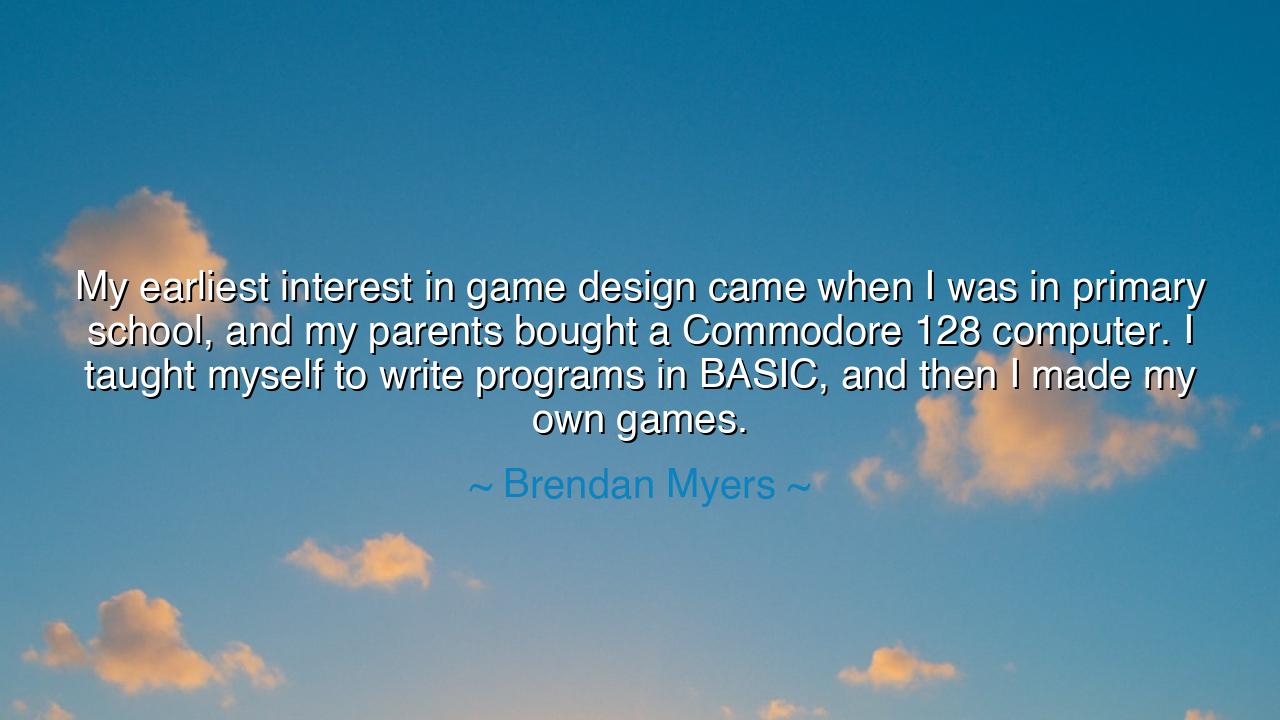
My earliest interest in game design came when I was in primary
My earliest interest in game design came when I was in primary school, and my parents bought a Commodore 128 computer. I taught myself to write programs in BASIC, and then I made my own games.






“My earliest interest in game design came when I was in primary school, and my parents bought a Commodore 128 computer. I taught myself to write programs in BASIC, and then I made my own games.” — Brendan Myers
In these humble and heartfelt words, Brendan Myers, a philosopher and designer of modern mythic games, offers more than a memory — he offers a window into the birth of creativity, curiosity, and the human drive to make worlds of our own. His recollection of the Commodore 128, that old machine of flickering screens and green text, is not just nostalgia; it is a symbol of awakening — the spark of invention that transforms wonder into mastery. He speaks of a time when a young mind, guided not by teachers or formal study, but by sheer imagination, found joy in creating something from nothing. This is the essence of the maker’s spirit — to see the potential in the simplest tool and to bring forth from it an entire universe.
To teach oneself is to walk the path of the ancients — the way of those who were guided by curiosity rather than instruction. When Myers learned BASIC, a language of pure logic and patience, he was doing what the old philosophers once did with words and ideas: learning to speak to creation itself. Through that dialogue between mind and machine, he discovered not only how games work, but how the world works — how rules, patterns, and choices weave together to create meaning. What he describes is not merely the making of games, but the birth of philosophy through design, for every game is a mirror of the human condition — filled with rules, choices, victories, and losses.
In the story of Myers and his Commodore, we see reflected the timeless story of human innovation. Just as the child Brendan experimented with code, so too did the young Leonardo da Vinci sketch his inventions, driven by a restless hunger to understand the nature of flight, motion, and beauty. Just as Leonardo studied gears and wings, Brendan studied loops and pixels — each transforming the tools of their age into instruments of imagination. The lesson is the same across centuries: genius does not wait for permission. It grows from curiosity made disciplined, from play turned into creation.
The ancients spoke of a fire stolen from the heavens — Prometheus’s gift to humankind — a symbol of knowledge and creation. In every child who sits before a machine or a blank page, trying to make something new, that same flame burns. Myers’s recollection of programming as a boy is an echo of this divine impulse: the longing to create worlds, to give life to dreams, to play the role of creator even within the limits of code. What begins as play becomes purpose. What begins as learning becomes legacy. And in that transformation, the child becomes the craftsman, the craftsman becomes the philosopher, and the philosopher becomes the teacher of generations.
Yet, beneath his words, there is also a quiet reverence — for the humility of beginnings. A simple computer, a child’s curiosity, and the patience to learn: from these small things, entire careers and philosophies are born. The Commodore 128, forgotten by time, becomes an altar of discovery. It reminds us that the tools of greatness are often modest, that creation does not require luxury, only love and persistence. Just as the sculptor sees the statue within the stone, the young Myers saw the game within the code — and brought it to life line by line, heartbeat by heartbeat.
From this quote, we also draw a broader truth about education and mastery. True learning is not about memorizing what has already been done, but about venturing into the unknown. To create something different, one must be willing to fail, to try, to experiment. The child who learned BASIC was not just programming — he was learning the art of problem-solving, of imagination under discipline. This balance between freedom and order is what defines all great creators, from architects to composers to scientists. Myers’s journey is a call to all who wish to create: begin, no matter how small, for even the simplest beginnings can give rise to worlds.
Lesson:
From Brendan Myers’s words, we learn that creation begins not with resources, but with resolve. The spark of genius does not lie in wealth or access, but in the courage to explore, to learn, to fail, and to try again. Whether you hold a computer, a brush, or a pen, do not wait for the world’s permission to begin your craft. Absorb what you can, teach yourself what you must, and let your curiosity lead you. For every invention, every art, every idea that has ever changed the world began as a small act of wonder — a child looking at a machine and saying, “What if I could make something of my own?” So take up your tools, whatever they may be, and make your own worlds. For it is in creation, not imitation, that we fulfill the oldest calling of all — to become co-creators with the divine, shaping meaning from the raw fabric of possibility.






AAdministratorAdministrator
Welcome, honored guests. Please leave a comment, we will respond soon